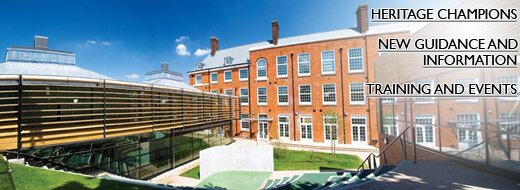HELM Newsletter January 2010
 |
|

Elm Court School, London Borough of Lambeth: the former Strand Grammar School is located within the Brixton Hill conservation area, and dates from 1912. The building has been home to a number of educational establishments over its lifetime, although by 2007 it had become somewhat dilapidated due to its disuse for a number of years. The exteriors of the building have been completely renovated, making a significant complementary contribution to the local streetscape once again. The addition of a glass enclosed staircase creates both a striking visual impact and contributes to the accessibility and circulation of staff and students © Clive Sherlock Photography
|
|
|
Welcome to the latest edition of the HELM newsletter. We are delighted to present this quarterly newsletter for your interest. Your next update will be April 2010. |
|
|
In planning the programme for the 2010 conference we would welcome the input of Heritage Champions. Is there a topic you feel would help you in your role, or any policy issue which you would like more training on? If so then please do email your suggestions to . |
|
Recent publications include:
Over recent years, there has been a significant increase in capital funding for school buildings across England, leading to large numbers of schools being remodelled, refurbished or rebuilt. The various funding streams (such as Building Schools for the Future or BSF) all have ambitious objectives to improve standards and facilities across the school estate, with over £20bn of scheduled investment over the next few years. Download Refurbishing Historic School Buildings.
As highlighted in our Conservation Areas at Risk Campaign, launched in June 2009, one of the most effective tools that Local Planning Authorities have at their disposal to control small scale erosion of character in their conservation areas is the Article 4 Direction. English Heritage has produced a step-by-step guide on how to make an Article 4 Direction, amplifying the text in Guidance on the Management of Conservation Areas (2006). Download Guidance on making Article 4 Directions.
This guidance has been prepared jointly by English Heritage and CABE to help local authorities in their consideration of planning applications for large digital screens in public places. Some of these will be part of the Live Sites programme for the London 2012 Olympic Games and the Paralympic Games, installed by the organising committee, LOCOG. However, increasingly there are proposals from other organisations, broadcasters and commercial companies to install large digital screens in towns and cities for a variety of purposes. Download Large digital screens in public spaces: Joint guidance from English Heritage and CABE. Our Common Heritage: Transforming Liabilities into AssetsA new guidance note that English Heritage has commissioned on transferring heritage assets from public ownership to the third sector. This is in response to the Quirk Review on Making Assets Work, which encouraged local authorities to transfer surplus or under-used property assets to community groups. URBED, an urban regeneration consultancy specialising in the re-use of redundant buildings, has been appointed to write the guidance, which is due for publication in June 2010. The commission is being supported with financial contributions and advice from the Architectural Heritage Fund, the Heritage Lottery Fund, the Prince’s Regeneration Trust, the National Trust and the Asset Transfer Unit of the Development Trusts Association. The new guidance is aimed at anyone involved in either disposing of or taking on heritage assets, whether they represent a local authority or a community enterprise. Its aim is to promote successful and sustainable outcomes by signposting existing sources of advice and illustrating examples of good practice. The guidance will be applicable to all types of heritage asset, including historic buildings and public open spaces. Issues to be covered will include stock surveys, specialist advice, feasibility studies, risk assessment, project development and funding. You may be able to help by suggesting examples of successful projects. For further information on the content of the guidance or suggestions for possible case studies, please contact Claire Farrell (Administrative Assistant) at URBED. Tel: . |
|
HELM TrainingEach year, the HELM training team have been able to offer more free training places to our local authority colleagues. This trend is set to continue in 2010 with new courses being piloted along with previously delivered courses to meet increasing demand. HELM training events
For details about other training courses that HELM are delivering in April and beyond, please visit helm.org.uk/training. We will upload further details about each course as soon as we can. If you have any questions about HELM training, please e-mail . |
|
Contact detailsIf you have any queries relating to this newsletter please email or phone Timothy Brooks on . If you wish to unsubscribe, please use the unsubscribe link. |

 English Heritage is beginning to plan for the 2010 Heritage Champions Conference. This follows on from the previous conference which was held in October 2008 in central London. The 2008 event included presentations from central government on key policy developments, English Heritage officials on heritage protection and Heritage at Risk, and views on what the network can achieve from a Champion and a local authority officer.
English Heritage is beginning to plan for the 2010 Heritage Champions Conference. This follows on from the previous conference which was held in October 2008 in central London. The 2008 event included presentations from central government on key policy developments, English Heritage officials on heritage protection and Heritage at Risk, and views on what the network can achieve from a Champion and a local authority officer. Refurbishing Historic School Buildings
Refurbishing Historic School Buildings Guidance on making Article 4 Directions
Guidance on making Article 4 Directions Large digital screens in public spaces: Joint guidance from English Heritage and CABE
Large digital screens in public spaces: Joint guidance from English Heritage and CABE